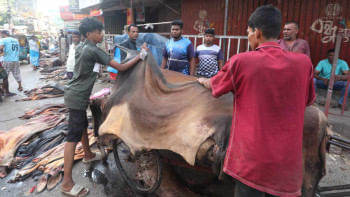Make sure law enforcers adhere to the rule of law
Human Rights Watch has urged Bangladesh to ensure that law enforcement agencies act neutrally and respect the rule of law to prosecute political violence.
The New York-based rights group issued a statement yesterday, a day after the United Nations unveiled its findings on serious human rights violations by the security forces in their brutal response to the 2024 student-led mass uprising.
Citing the UN report, HRW mentioned that law enforcement agencies, including the police, border guards, the Rapid Action Battalion, and intelligence services, were involved in extrajudicial killings, indiscriminate firing, mass arrests, and torture during the crackdown.
The UN report estimates that up to 1,400 people were killed between July 1 and August 15, 2024, with the vast majority shot dead by security forces.
The interim government, led by Nobel laureate Muhammad Yunus, has pledged security sector reform. HRW noted that the government launched "Operation Devil Hunt" following violent protests earlier this month, arresting nearly 2,000 people—mostly supporters of the deposed AL government.
The operation was triggered after a clash on February 8 centring an attack at the home of a former minister. Protesters had earlier demolished the home of ousted prime minister Sheikh Hasina's father Sheikh Mujibur Rahman, which had been converted into a memorial museum.
In a statement, the interim government said the operation targeted groups "linked to the fallen autocratic regime", describing them as "devils", says the HRW statement.
Meenakshi Ganguly, deputy Asia director at HRW, said, "Bangladesh is politically polarised after decades of repression by the Awami League government, but the authorities should not repeat mistakes of the past and should instead ensure impartial rule of law."
"As the United Nations has said, the interim government should focus on urgent reforms to the political system and economic governance."
The HRW statement mentioned Yunus also called for calm and he said that respecting the rule of law is "what differentiates the new Bangladesh we are working together to build from the old Bangladesh under the fascist regime".
"However, the government should also recognise that the right to peaceful assembly and protest, even by supporters of the former authoritarian government, is a fundamental right protected under international law," it said.
The rights group advised the Yunus government to consider bringing a consensus resolution at the upcoming UN Human Rights Council session in March to request technical assistance, further investigations, and monitoring and reporting by UN-backed human rights experts.
It said the resolution should also acknowledge the tyranny of the previous administration and recognise positive human rights steps taken by the interim government.
"Bangladeshis are angry over the repression by the Hasina administration and they deserve justice and accountability, but it has to be a rights-respecting manner," HRW's Ganguly said.
"All crimes, including mob violence, should be punished, but when authority figures characterise opponents as the 'devil,' it can fuel abuses by security forces that have never faced accountability."

 For all latest news, follow The Daily Star's Google News channel.
For all latest news, follow The Daily Star's Google News channel. 



Comments